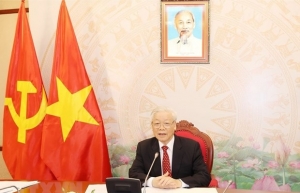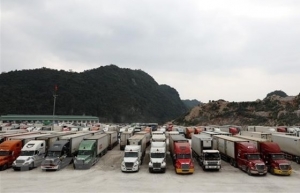Vietnam should act now to avoid pandemic resurgence
The lifting of restrictions coincides with a dramatic increase in infections and deaths due to the pandemic within the Chinese borders. In fact, official data showed infections last December to be the highest ever recorded for China since the start of the pandemic. Despite this, the World Health Organization thinks the risk of a new pandemic wave globally is minor, as the current COVID-19 variant in China apparently is a subtype of Omicron, for which most vaccines should be effective.
 |
| Dr. Daniel Borer, Interim program manager of Global Business, RMIT Australia and Dr. Nuno F. Ribeiro, senior lecturer of Tourism and Hospitality, RMIT Vietnam |
Still, other experts warn that the virus could easily mutate within China into new variants, given that mass infections are expected to occur due to the massive travelling of the upcoming holidays. Currently, there is a lack of accurate and transparent data in China regarding infections and fatalities, making it unclear how dangerous the current pandemic threat is.
In most countries, the most recent COVID-19 vaccinations took place 6-12 months ago. Some experts warn that they may have lost a great deal of their effectiveness, especially if new variants are incoming. Japan and South Korea have recently stopped issuing short-term visas for Chinese travellers, much to the dismay of Chinese authorities, which were quick in imposing travel bans to Japan and South Korea in return.
Many other countries like Canada, the United States, and Germany force Chinese travellers to present negative tests. Some countries like Belgium and Malaysia have introduced checks on residual waters on flights to test for traces of COVID-19. On the other hand, countries like Thailand are welcoming long-missed Chinese tourists with flowers at their airports, happy to receive the boost in their still ailing sector.
For a country like Vietnam, which shares borders and many economic ties with the northern giant, the pressing question is whether travel restrictions should be imposed or not and whether other measures need to be implemented. A lot is at stake as China is a key economic and tourism partner for the country.
Undoubtedly, China is one of the key global business partners for Vietnam. With imports of $109 billion in 2022, representing one-third of total imports, China is Vietnam’s top importer. Also, it is Vietnam’s second-largest export partner with $53 billion, representing 15.3 per cent of total exports in 2022.
In terms of foreign direct investment, China initiated 283 new projects in 2022, second only after South Korea, with a total value of $2.5 billion. Furthermore, China is expected to experience solid economic growth in 2023 with its GDP growing by 5 per cent. Hence, having good relations with our northern business partner can be a key element for Vietnam in the year to come as economic growth is expected to slow down.
It is not surprising that Vietnamese businesses have received the lifting of travel restrictions from China with relief. Not having to quarantine or present negative COVID-19 tests when entering China will speed up transport and improve supply chains, as China’s imports are essential for garments and textiles as well as the electronic manufacturing industry of Vietnam.
The tourism sector sees opportunities in China’s reopening. Before 2020, China was the largest market for Vietnam tourism, with Chinese tourists accounting for as much as 5.9 million visitors in 2019, consistently making up 20-25 per cent of total in international arrivals. However, while Chinese visitors made up in numbers, they lacked in expenditure per capita and length of stay.
When compared with other markets such as South Korea, the United States, and France, Chinese tourists were likely to spend less and stay for a shorter time. They were also less likely to return a second time.
Furthermore, the potential for external leakages is also high, as it occurred in the past with infamous zero-VND tours whereby Chinese tourists would buy all-inclusive travel packages to Vietnam which comprised Chinese-owned travel agencies, transportation, and accommodation, with little Chinese tourist expenditures staying in Vietnam.
With Vietnam being opened to tourism for almost a year now, it is nevertheless experiencing a slow recovery in this area. According to statistics from the Vietnam National Administration of Tourism (VNAT), total international arrivals in 2022 reached 3.4 million, up 98 per cent over the same period in 2021 but falling short of the targeted five million international arrivals proposed by the government.
Over the past two years, the total absence of Chinese tourists forced Vietnam to turn to other markets to make up for lost demand. Markets such as South Korea, the US, and France were re-emphasised, and new markets such as India and Singapore revealed themselves to be potentially lucrative.
The absence of Chinese tourists also ensured that Vietnam had to redouble its efforts regarding domestic tourism, and this was immensely successful. As of December 2022, domestic tourism figures are on par with 2019, and experts predict a boom of local travellers this year.
Nonetheless, the appetite for Chinese tourists is great in Vietnam. Recently, the VNAT, various departments of tourism, and several private tourism businesses have emphasised the need to recapture the Chinese market, with an emphasis on the luxury segment. While local authorities have been emphatic in the need for pandemic prevention, there has been little talk of which, if any, preventive measures will be put in place to prevent future outbreaks originating from Chinese visitors.
Although an early travel ban paired with enforced quarantines was indeed beneficial in 2020, this may not be the appropriate response currently. Vietnam’s population is largely vaccinated and vaccines are readily available. Furthermore, China has made it clear that travel bans will see retaliation, which may negatively impact the two countries’ business relations.
Still, monitoring incoming Chinese travellers is required. Measures such as presenting a recent negative COVID-19 test as well as checking residual waste on flights for traces of COVID-19 can easily be implemented without detriment to the flow of travellers to this country. Similar measures should be considered for incoming travellers from countries in the Asia-Pacific region which had not implemented sufficient control measures to Chinese travellers.
The Vietnamese government has demonstrated it can be very proactive when it comes to containing the pandemic and protecting people, and it has been rightfully praised for doing so. It is probably high time to be proactive once again.
 | Vietnam stands to win as “China+1” gains traction Changes in the global supply chain are taking place due to the virus outbreak, prompting a mounting number of foreign manufacturers to speed up their relocation from China to neighbouring countries including Vietnam. |
 | Top leaders of Vietnam, China agree to step up result-oriented cooperation Vietnamese Party General Secretary and State President Nguyen Phu Trong and his Chinese counterpart Xi Jinping consented to step up result-oriented cooperation between the two countries during their phone talk on September 29. |
 | Vietnam, China seek solutions to cargo congestion at border gates Vietnamese Deputy Minister of Foreign Affairs Nguyen Minh Vu has held phone talks with Chinese Assistant Foreign Minister Wu Jianghao to discuss measures to accelerate the circulation of goods through border gates between the two countries. |
 | Opportunities for Vietnam amid China policy switch The easing of China's pandemic restrictions is expected not only to help Vietnam increase the number of international tourists, but also to attract investment, according to various experts. |
What the stars mean:
★ Poor ★ ★ Promising ★★★ Good ★★★★ Very good ★★★★★ Exceptional
Related Contents
Latest News
More News
- SK Innovation-led consortium wins $2.3 billion LNG project in Nghe An (February 25, 2026 | 07:56)
- THACO opens $70 million manufacturing complex in Danang (February 25, 2026 | 07:54)
- Phu Quoc International Airport expansion approved to meet rising demand (February 24, 2026 | 10:00)
- Bac Giang International Logistics Centre faces land clearance barrier (February 24, 2026 | 08:00)
- Bright prospects abound in European investment (February 19, 2026 | 20:27)
- Internal strengths attest to commitment to progress (February 19, 2026 | 20:13)
- Vietnam, New Zealand seek level-up in ties (February 19, 2026 | 18:06)
- Untapped potential in relations with Indonesia (February 19, 2026 | 17:56)
- German strengths match Vietnamese aspirations (February 19, 2026 | 17:40)
- Kim Long Motor and AOJ Suzhou enter strategic partnership (February 16, 2026 | 13:27)

 Tag:
Tag:




















 Mobile Version
Mobile Version